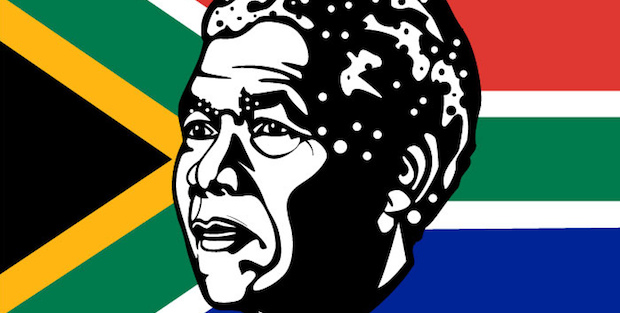This past Tuesday morning, we celebrated the life of Nelson Mandela by observing a minute of silence in all of our classes from CE2* through Terminale, just as leaders from around the world gathered in Johannesburg to attend the official memorial service for this extraordinary human being, universally considered to be one of the greatest public figures to have marked our collective history. Thanks to outstanding work by the LFNY documentation team, our primary and secondary school librairies also created displays of articles and books for students interested in learning more about Mr. Mandela, while teachers from across the Lycée Français de New York took time to discuss this unforgettable man and his legacy.
Encounter with a baby
And outside of the classroom too, we have seized every opportunity to engage in conversation about the beloved former president of South Africa, “Madiba” as he is affectionately known in his own country and beyond. I myself have been interested to know the first words which come to mind when our students hear his name, to which they have responded as follows, to take but a few examples from among the many comments I have been recording all week: “liberator”, “commitment, never give up”, “the courage to stand up for what you believe in no matter what the consequences”, “justice ”, “advancing humanity”, “forgiveness”, “respecting everyone, even those who put you in jail for 27 years”, “love”, “the man who ended Apartheid by doing the opposite of Apartheid,” “optimism”, “lucidity, “human rights”, “beauty”, “someone who was so passionate he could not be stopped”, “baby”.
“Baby?” I inquired, upon receiving that particular reply. “Yes,” continued our student, recounting something her mother had told her the previous night. Right after Nelson Mandela was released from jail, he was driving along a street somehwere in South Africa, when he suddenly requested that the driver pull over so that he could get out and talk to the people he saw all around him, as if to overcome the lonelineness he had accumulated over many years of imprisonment.
Leaving bitterness and hatred behind
Of course, everyone wanted to speak with him and shake his hand and hug him and sing songs for him, which made Mr. Mandela very happy, so very happy that he ended up walking through the streets for two or three hours. And then, our middle schooler continued, he saw a woman carrying a baby, a little girl asleep in a blanket. Very quietly, and with the mother’s permission, Nelson Mandela picked up the baby and held her in his arms.
“Thank you very much for such a wonderful tale,” I said, after waiting to be sure our student had finished. “Do you have any idea of what happened next?” I queried. No, came the answer. “I’m curious,” I went on, “what is it about this lovely story you find so memorable?” Our young person paused before responding and then did so with that exceptional empathy that distinguishes our students: Nelson Mandela wanted to feel the warmth of his fellow human beings and there is nothing better in that sense than holding a baby.
And maybe, she added, he was thinking about the kind of world he wanted the little infant to grow up in, the kind of world he would use his influence to build. You’re absolutely right, I replied, paraphrasing a quotation from Madiba himself: “As I walked out the door toward the gate that would lead to my freedom, I knew if I didn’t leave my bitterness and hatred behind, I’d still be in prison.”
*One of our 3rd grade classes sang a song in honor of Nelson Mandela. Can you recognize it?
Photo by Vectorportal.com
About the Author :
Sean Lynch was Head of School at the Lycée Français de New York from 2011 to 2018, after having spent 15 years at another French bilingual school outside of Paris: the Lycée International de St. Germain-en-Laye. Holding both French and American nationalities, educated in France (Sciences Po Paris) and the United States (Yale), and as the proud husband of a French-American spouse and father of two French-American daughters, Sean Lynch has spent his entire professional and personal life at the junction between the languages, cultures and educational systems of France and the United States. In addition to being passionate about education, he loves everything related to the mountains, particularly the Parc National du Mercantour.

